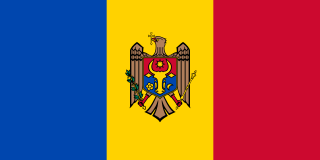
Moldova, officially the Republic of Moldova, is a landlocked country in Eastern Europe. It is bordered by Romania to the west and Ukraine to the north, east, and south. The unrecognised state of Transnistria lies across the Dniester river on the country's eastern border with Ukraine. Moldova's capital and largest city is Chișinău.

Chișinău, also rendered Kishinev, is the capital and largest city of the Republic of Moldova. The city is Moldova's main industrial and commercial centre, and is located in the middle of the country, on the river Bîc, a tributary of the Dniester. According to the results of the 2014 census, the city proper had a population of 532,513, while the population of the Municipality of Chișinău was 700,000. Chișinău is the most economically prosperous locality in Moldova and its largest transportation hub. Nearly a third of Moldova's population lives in the metro area.
Moldovan, also known historically as Moldavian, was a local name of the Romanian language in Moldova. Moldovan was declared the official language in Article 13 of the constitution adopted in 1994, while the 1991 Declaration of Independence of Moldova used the name Romanian. In 2003, the Moldovan parliament adopted a law defining Moldovan and Romanian as glottonyms for the same language. In 2013, the Constitutional Court of Moldova interpreted that Article 13 of the constitution is superseded by the Declaration of Independence, thus giving official status to the name Romanian. The breakaway region of Transnistria continues to recognize Moldovan as one of its official languages, alongside Russian and Ukrainian. Ukraine also continues to make a distinction between Moldovan and Romanian, with one village declaring its language to be Romanian and another declaring it to be Moldovan, though Ukrainian officials have announced an intention to remove the legal status of Moldovan.

Transnistria, officially the Pridnestrovian Moldavian Republic (PMR), is an unrecognised breakaway state that is internationally recognised as a part of Moldova. Transnistria controls most of the narrow strip of land between the Dniester river and the Moldovan–Ukrainian border, as well as some land on the other side of the river's bank. Its capital and largest city is Tiraspol. Transnistria has been recognised only by three other unrecognised or partially recognised breakaway states: Abkhazia, Artsakh and South Ossetia. Transnistria is officially designated by the Republic of Moldova as the Administrative-Territorial Units of the Left Bank of the Dniester or as Stînga Nistrului. In March 2022, the Parliamentary Assembly of the Council of Europe adopted a resolution that defines the territory as under military occupation by Russia.

Gagauzia or Gagauz-Yeri, officially the Autonomous Territorial Unit of Gagauzia (ATUG), is an autonomous territorial unit of Moldova. Its autonomy is ethnically motivated by the predominance in the region of the Gagauz people, who are primarily Orthodox Turkic-speaking people.

Orhei, also formerly known as Orgeev, is a city, municipality and the administrative centre of Orhei District in the Republic of Moldova, with a population of 21,065. Orhei is approximately 40 kilometres north of the capital, Chișinău.

Moldovans, sometimes referred to as Moldavians, is a term used to describe the Romanian-speaking indigenous people of the Republic of Moldova and the largest self-declared ethnic group of the Republic of Moldova as well as a significant minority in Ukraine and Russia. There is an ongoing controversy, in part involving the linguisitic definition of ethnicity, over whether Moldovans' self-identification constitutes an ethnic group distinct and apart from Romanians, or a subset.

Giurgiulești is a commune in the Cahul District of Moldova. It is also a border crossing point to Romania, located 10 km (6.2 mi) from Galați.

Mărculești is a city in Florești District, in northern Moldova, with a population of 2,081 at the 2004 census. The city was once the site of a Jewish agricultural and mercantile colony until its destruction in the Holocaust.
Copanca is a village in Căușeni District, Moldova.
Cățeleni is a village in Hîncești District, Moldova.
Călmățui is a village in Hîncești District, Moldova.

Bucovăț is a town in Strășeni district, Moldova. One village is administered by the town, Rassvet.
Ghindești is a town in Florești District, Moldova.
Biruința is a town in Sîngerei District, Moldova.

Ocnița is a town and the administrative center of Ocnița District, Moldova.
Roșu is a village in Cahul District, Moldova.
Tătărești is a village in Cahul District, Moldova.
The 2014 Moldovan census was held between 12 and 25 May 2014. It was organized by National Bureau of Statistics of the Republic of Moldova.
According to the Moldovan law on territorial administrative organisation, two or more villages can form together a commune.










